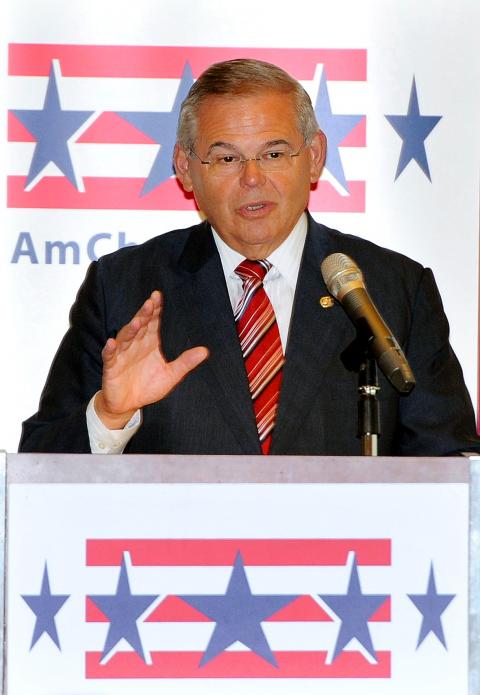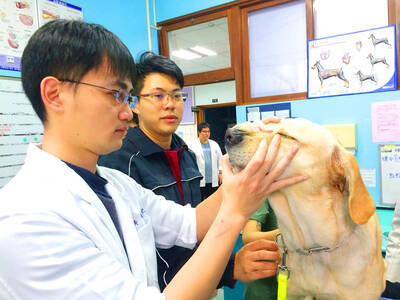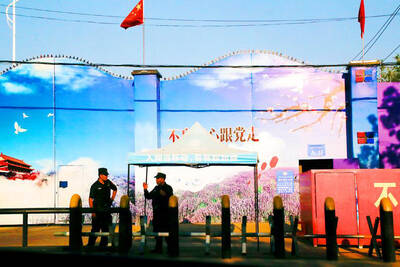US Senate Foreign Relations Committee Chairman Robert Menendez said in Taipei yesterday that he would back Taiwan’s accession to the Trans-Pacific Partnership (TPP), “provided that Taiwan is willing to support a high-standard, comprehensive agreement” to address various issues, such as labor and environment, currency manipulation and intellectual property rights.
He said the issues were “critical elements” of the proposed pact.
The senator delivered a speech titled “The Future of US-Taiwan Relations” at a luncheon hosted by the American Chamber of Commerce in Taipei yesterday, the second day of his three-day visit.

Photo: Liao Chen-huei, Taipei Times
While applauding some of the reforms Taiwan has made to open up its public procurement market after becoming a member of the WTO’s Agreement on Government Procurement in 2009, Menendez said that “some US firms continue to encounter problems relating to transparency, contract terms and conditions, licensing and liability.”
He also said he was concerned about the restrictions imposed on foreign investors in agricultural production, chemical manufacturing, public utility, transportation, telecommunications, high-speed rail and a natural gas pipeline.
With the resumption of bilateral talks under the bilateral Trade and Investment Framework Agreement (TIFA) in March, Menendez said he was confident that the US and Taiwan could continue to work together to solve the challenges of “a fully open and transparent relationship.”
Menendez said he had talked to President Ma Ying-jeou (馬英九) by telephone, and Vice President Wu Den-yih (吳敦義) and Minister of Economic Affairs Chang Chia-juch (張家祝) at separate meetings earlier in the day, saying he “looked forward to strengthening our economic partnership” under the TIFA platform.
Taiwan and the US set up a “working group on investment” during the TIFA negotiations in March to further explore issues under a bilateral investment agreement (BIA), in addition to a “working group on technical barriers to trade.”
Menendez said he had conveyed his “strong support” for a US-Taiwan BIA to US Trade Representative Michael Froman.
Over the years, Washington and Taipei have made tremendous progress in deepening bilateral relationships, Menendez said, citing the inclusion of Taiwan in the US visa waiver program, the resumption of TIFA talks, security cooperation and US legislation in support of Taiwan’s participation in the International Civil Aviation Organization as an observer, which he authored.
Menendez said that constructive and strategic US engagement in Asia was in the interests of all nations in the region and would help create a mutually beneficial future for both the US and Taiwan, as well as for the world.
The Ministry of Foreign Affairs said Menendez’s visit to Taipei is the first by the chairman of the Foreign Relations Committee since US Vice President Joe Biden visited in 2001.
Menendez’s trip to Asia is his first since becoming chairman of the committee in January.
He had meetings yesterday with Premier Jiang Yi-huah (江宜樺) and Legislative Speaker Wang Jin-pyng (王金平). Officials who were present at those meetings said Menendez brought up issues related to the controversy over the Fourth Nuclear Power Plant, the government’s policy to turn the army into an all-volunteer force and security-related matters.
The senator was also scheduled to meet with Minister of National Defense Yen Ming (嚴明).
Menendez leaves Taiwan today.

Former Czech Republic-based Taiwanese researcher Cheng Yu-chin (鄭宇欽) has been sentenced to seven years in prison on espionage-related charges, China’s Ministry of State Security announced yesterday. China said Cheng was a spy for Taiwan who “masqueraded as a professor” and that he was previously an assistant to former Cabinet secretary-general Cho Jung-tai (卓榮泰). President-elect William Lai (賴清德) on Wednesday last week announced Cho would be his premier when Lai is inaugurated next month. Today is China’s “National Security Education Day.” The Chinese ministry yesterday released a video online showing arrests over the past 10 years of people alleged to be

THE HAWAII FACTOR: While a 1965 opinion said an attack on Hawaii would not trigger Article 5, the text of the treaty suggests the state is covered, the report says NATO could be drawn into a conflict in the Taiwan Strait if Chinese forces attacked the US mainland or Hawaii, a NATO Defense College report published on Monday says. The report, written by James Lee, an assistant research fellow at Academia Sinica’s Institute of European and American Studies, states that under certain conditions a Taiwan contingency could trigger Article 5 of NATO, under which an attack against any member of the alliance is considered an attack against all members, necessitating a response. Article 6 of the North Atlantic Treaty specifies that an armed attack in the territory of any member in Europe,

LIKE FAMILY: People now treat dogs and cats as family members. They receive the same medical treatments and tests as humans do, a veterinary association official said The number of pet dogs and cats in Taiwan has officially outnumbered the number of human newborns last year, data from the Ministry of Agriculture’s pet registration information system showed. As of last year, Taiwan had 94,544 registered pet dogs and 137,652 pet cats, the data showed. By contrast, 135,571 babies were born last year. Demand for medical care for pet animals has also risen. As of Feb. 29, there were 5,773 veterinarians in Taiwan, 3,993 of whom were for pet animals, statistics from the Animal and Plant Health Inspection Agency showed. In 2022, the nation had 3,077 pediatricians. As of last

XINJIANG: Officials are conducting a report into amending an existing law or to enact a special law to prohibit goods using forced labor Taiwan is mulling an amendment prohibiting the importation of goods using forced labor, similar to the Uyghur Forced Labor Prevention Act (UFLPA) passed by the US Congress in 2021 that imposed limits on goods produced using forced labor in China’s Xinjiang region. A government official who wished to remain anonymous said yesterday that as the US customs law explicitly prohibits the importation of goods made using forced labor, in 2021 it passed the specialized UFLPA to limit the importation of cotton and other goods from China’s Xinjiang Uyghur region. Taiwan does not have the legal basis to prohibit the importation of goods